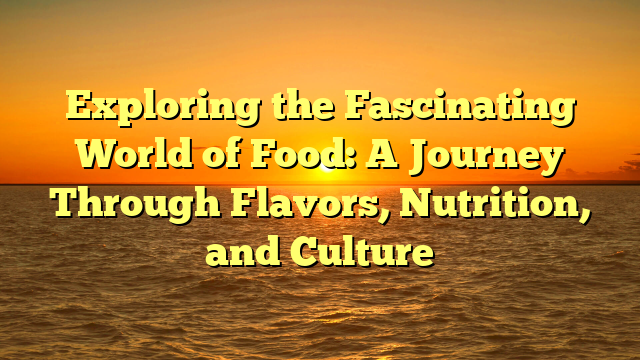
Food is more than just fuel for our bodies; it’s a bridge that connects us to our cultures, our
history, and our sense of well-being. From the rich, savory flavors of a home-cooked meal to
the sophisticated presentation of a gourmet dish, food holds an undeniable power to impact
our emotions, health, and social lives. slot deposit 25 bonus 25 explores the multifaceted nature of food,
delving into its significance, the science of nutrition, its cultural importance, and how it
continues to evolve in our ever-changing world.
The Role of Food in Our Lives
Food is essential for life. It provides the nutrients our bodies need to survive, grow, and
function effectively. But beyond survival, food plays a central role in many aspects of our
lives. It shapes our traditions, defines our identities, and brings people together. Food is
often a symbol of hospitality, a sign of celebration, or a gesture of love and care. Whether it’s
a family gathering around the dinner table, friends enjoying a meal at a restaurant, or a
community coming together to share a traditional dish, food is a universal language that
transcends barriers.
The Science of Nutrition
Food provides us with the necessary nutrients to maintain energy, repair tissues, and
support various bodily functions. These nutrients are classified into macronutrients (proteins,
fats, carbohydrates) and micronutrients (vitamins and minerals). Each has its unique role in
maintaining health and well-being.
Proteins are the building blocks of our bodies. They play a crucial role in cell growth, repair,
and immune function. High-protein foods include meat, poultry, fish, eggs, and plant-based
sources like beans, lentils, and tofu.
Carbohydrates are our body’s primary energy source. Found in grains, fruits, vegetables,
and legumes, carbohydrates provide quick energy. However, it’s essential to differentiate
between simple carbs (like sugar) and complex carbs (like whole grains), as the latter
provides more sustainable energy and is rich in fiber.
Fats are important for energy storage and the absorption of fat-soluble vitamins (A, D, E, and
K). Healthy fats, such as those found in nuts, seeds, avocados, and fish, are vital for brain
function and heart health. Conversely, trans fats and excessive saturated fats can contribute
to various health problems.
Vitamins and Minerals support various bodily functions, including immune health, bone
strength, and energy production. These micronutrients are abundant in fruits, vegetables,
dairy products, and whole grains.
The balance of these nutrients, combined with adequate hydration, is vital for maintaining
good health. However, overconsumption or deficiency of certain nutrients can lead to health
problems. For example, too much sugar can lead to obesity and diabetes, while inadequate
intake of fiber can cause digestive issues.
The Cultural Importance of Food
Food has always been intertwined with culture. Every region of the world has its culinary
traditions, many of which have been passed down through generations. Food serves as a
reflection of a region’s geography, climate, history, and even its social and political
landscape.
In Italy, food is more than just a meal; it’s a way of life. The Italian kitchen is known for its
simplicity and reliance on fresh, local ingredients, which is seen in dishes like pasta, pizza,
and risotto. The Mediterranean diet, rich in fruits, vegetables, whole grains, and olive oil, has
been linked to various health benefits, including a lower risk of heart disease.
In contrast, Japanese cuisine is known for its emphasis on seasonal ingredients and
techniques that highlight the natural flavors of food. Sushi, sashimi, and tempura are just a
few examples of Japanese dishes that showcase the country’s meticulous approach to food
preparation.
Across Africa, food holds a deep cultural significance. From the spicy stews of North Africa
to the rice dishes of West Africa, the continent’s diverse culinary landscape is deeply rooted
in tradition. For instance, jollof rice, a dish often associated with Nigeria, has become a
symbol of African unity and celebration.
Similarly, in the Middle East, food is an integral part of family gatherings and religious
observances. Dishes like hummus, falafel, and kebabs are staples of the region and often
reflect the area’s rich history and fusion of influences from neighboring countries.
The Globalization of Food
As the world becomes more connected, so too does the culinary world. Globalization has
made it possible for people to enjoy foods from all corners of the world. Sushi in New York,
tacos in Tokyo, and pasta in Buenos Aires—these once-regional dishes have become global
phenomena. The rise of food delivery services, international grocery chains, and the
popularity of cooking shows has made it easier than ever for people to explore and enjoy
different cuisines.
However, this globalization of food has also led to challenges. Traditional food systems and
farming practices are being replaced by mass-produced, processed foods. Fast food chains
have spread worldwide, often offering cheap and convenient meals that may not be
nutritionally balanced. This shift in food production and consumption patterns has raised
concerns about food security, sustainability, and the impact of industrial farming on the
environment.
The Future of Food
The future of food is an exciting and dynamic space, where technology and sustainability are
playing an increasingly important role. Innovations such as lab-grown meat, plant-based
alternatives, and vertical farming are revolutionizing the way we produce and consume food.
Plant-based diets are gaining popularity due to their environmental and health benefits. As
concerns over climate change and animal welfare grow, many people are opting for meat
substitutes like Beyond Meat and Impossible Foods. These products aim to replicate the
taste and texture of meat while reducing the ecological impact associated with traditional
animal farming.
Vertical farming, which involves growing crops in stacked layers or towers, is another
promising innovation. This method uses less land and water, making it a more sustainable
way to produce food in urban areas. Similarly, lab-grown meat offers a potential solution to
the environmental and ethical concerns related to livestock farming.
As we look to the future, the integration of technology, sustainability, and health-conscious
choices will continue to shape the way we think about food.
Conclusion
Food is much more than just sustenance; it is a reflection of our culture, our history, and our
environment. It nourishes our bodies and brings people together, fostering relationships and
traditions. The science of nutrition plays a vital role in understanding how food impacts our
health, while the cultural significance of food helps define who we are. As we face new
challenges and opportunities in food production and consumption, the future promises
exciting innovations that will continue to transform the way we approach the food we eat.
Food, in all its forms, remains a central part of the human experience.




